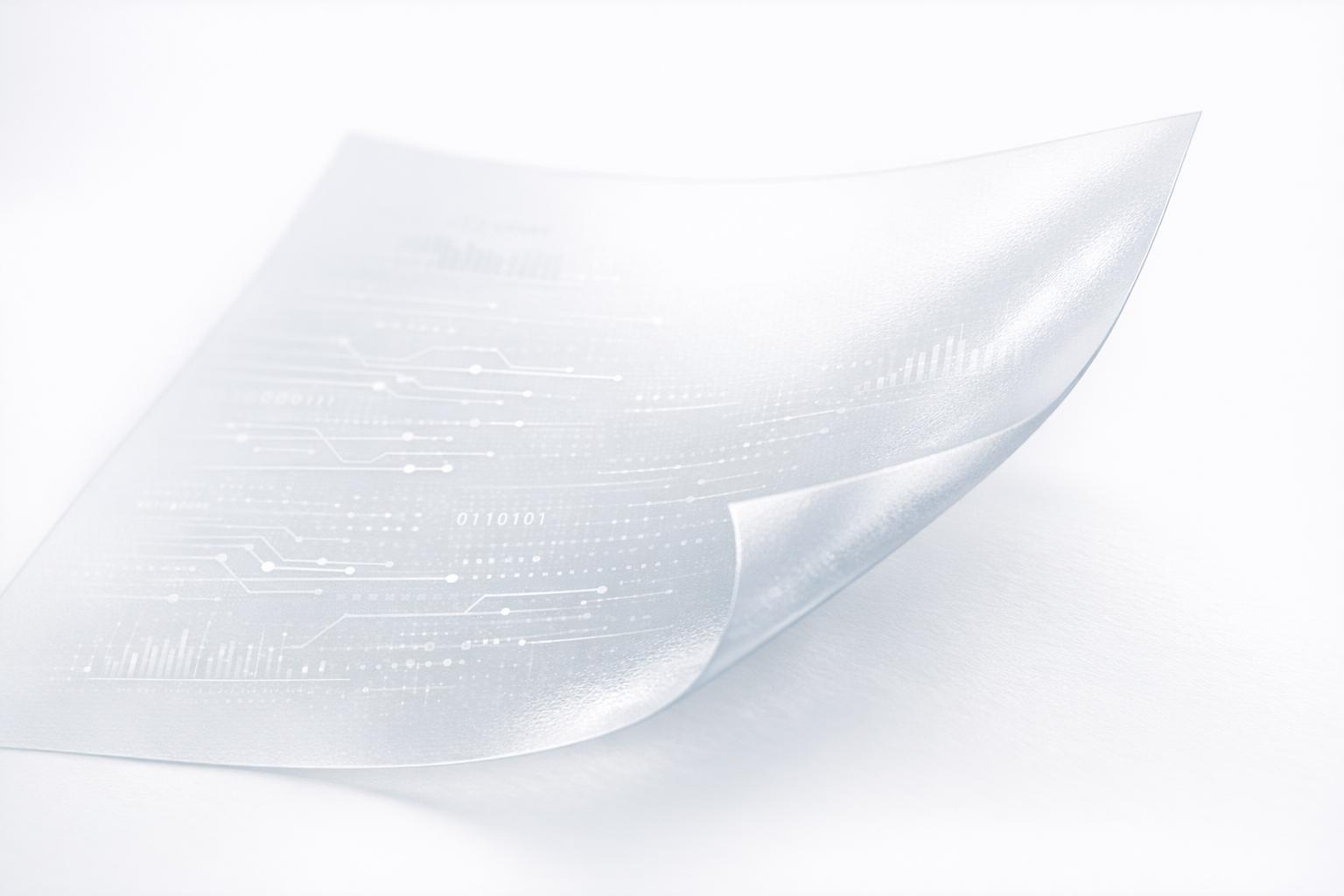Blockchain technology offers a transparent and secure solution for managing music royalties, ensuring artists receive fair and prompt payments.
- Direct Payments to Artists: Smart contracts automate royalty payments directly to artists when their music is played or streamed, eliminating middlemen like record labels.
- Transparent Record of Transactions: All music consumption and royalty payments are recorded on a public, decentralized ledger accessible to everyone, ensuring transparency.
- Instant and Accurate Payments: Artists receive their royalties instantly and accurately through automated smart contracts, without delays or errors.
- Secure and Tamper-Proof System: Blockchain’s encryption and decentralized structure protect against fraud, mistakes, and unauthorized changes to the royalty payment system.
If you are a Music Enterprise, then we recommend you book a call with us to track and protect against fraud.
Key Benefits of Blockchain for Music Royalties:
| Benefit | Description |
|---|---|
| Transparency | Public ledger ensures accuracy and visibility into transactions |
| Efficiency | Automated royalty payments reduce administrative work and delays |
| Direct Connection | Artists can connect directly with fans, increasing their earnings |
| Security | Advanced encryption and decentralization protect against fraud and errors |
Decentralized Music Platforms and Tokenization:
- Decentralized Music Platforms like Audius and Ujo Music allow artists to sell music directly to fans and receive instant payments through blockchain technology.
- Tokenization and NFTs enable artists to create digital assets representing ownership and royalty rights, allowing fans to invest in their favorite artists and share in the royalties.
By leveraging blockchain technology, the music industry can create a more equitable, transparent, and sustainable system for managing music royalties, ensuring fair compensation for artists and fostering a closer connection between artists and fans.
Related video from YouTube
Understanding Blockchain
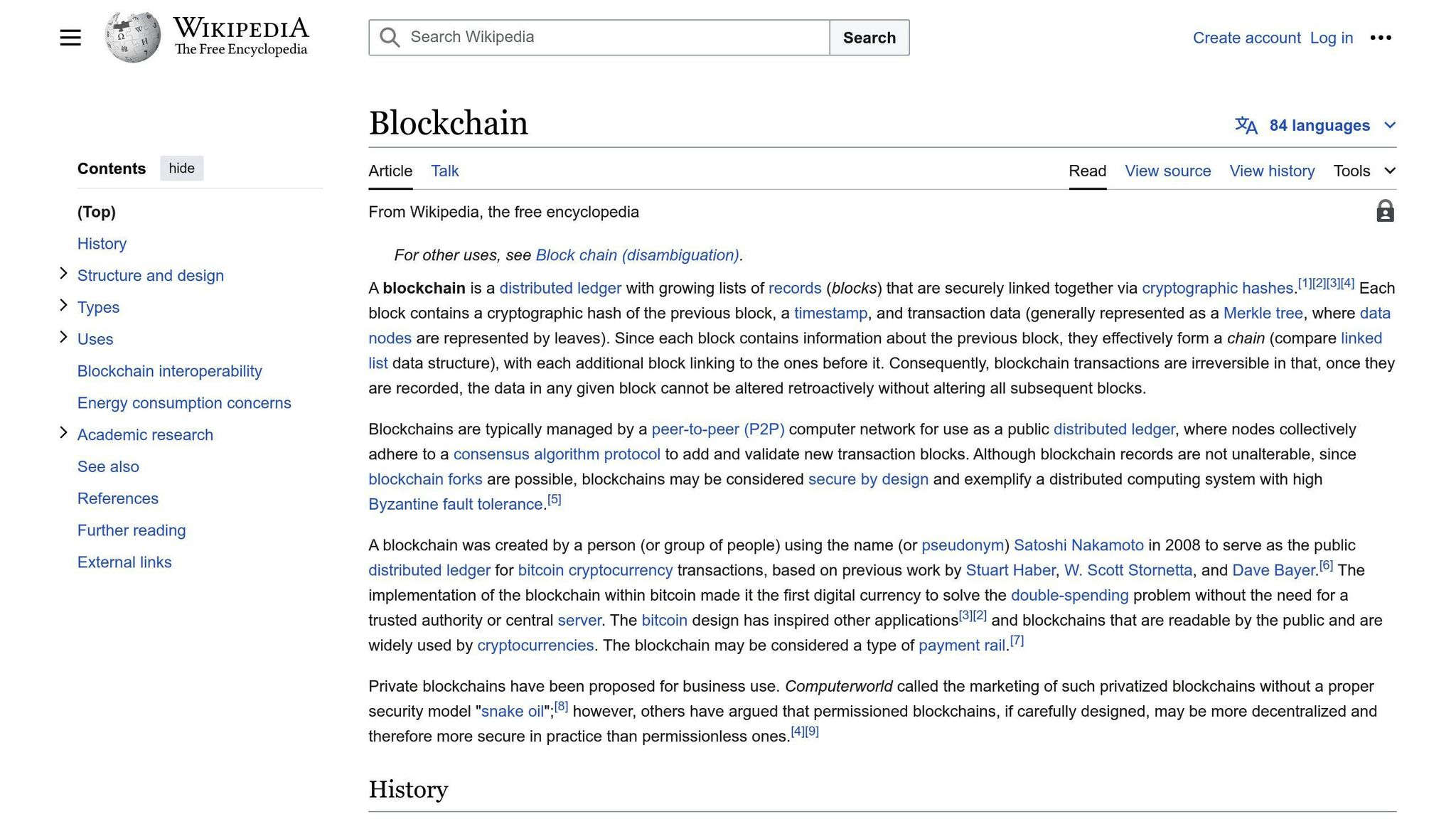
A Shared and Transparent Record
Blockchain is a decentralized network where all transactions are recorded on a public ledger that everyone can see. This means no single entity controls the data, making it transparent and secure.
For music royalties, a shared ledger allows artists and rights holders to track their royalties in real-time, ensuring accuracy and transparency. This removes the need for middlemen, reducing errors and fraud.
Key Parts of Blockchain
Blockchain technology has several key components:
- Encryption: Secures transactions and data through advanced coding methods.
- Consensus mechanisms: Validates transactions and ensures agreement among network participants, like Proof of Work (PoW) or Proof of Stake (PoS).
- Distributed databases: Stores and updates the blockchain ledger, keeping data consistent across the network.
These parts work together to create a secure, transparent, and efficient system for managing music royalties.
Benefits of Blockchain for Royalties
Blockchain offers several advantages for music royalty management:
| Benefit | Description |
|---|---|
| Transparency | All transactions are recorded on a public ledger, ensuring accuracy. |
| Security | Advanced encryption and decentralized structure protect against fraud and mistakes. |
| Efficiency | Automates royalty payments, reducing administrative work and increasing speed. |
| Direct Connection | Enables artists to connect directly with fans, increasing their share of royalties. |
Issues with Traditional Royalty Systems
Complex Royalty Calculations
Calculating music royalties is a complex process involving many parties like record labels, publishers, and performance rights organizations. Royalties depend on factors like songwriting credits, publishing agreements, and territorial rights. However, the lack of standardization and transparency often leads to disputes and incorrect payments to artists.
Lack of Transparency
Traditional royalty systems lack transparency, making it difficult for artists to track their earnings and understand how their royalties are distributed. This lack of transparency can lead to mistrust, as artists may suspect they are not receiving their fair share.
Payment Delays
Royalties are often paid out months or even years after the music has been consumed, making it challenging for artists to manage their finances and plan for the future. These delays are due to the complex nature of royalty calculations and the multiple intermediaries involved.
Fraud and Error Risks
Traditional royalty systems are vulnerable to fraud and errors. The manual processes involved in royalty calculations and distributions can lead to mistakes, and the lack of real-time tracking makes it difficult to detect and prevent fraudulent activities. These risks can result in financial losses for artists and stakeholders, further eroding trust in the system.
| Issue | Description |
|---|---|
| Complex Calculations | Lack of standardization and transparency leads to disputes and incorrect payments. |
| Lack of Transparency | Artists cannot track earnings or understand royalty distributions. |
| Payment Delays | Royalties are paid out months or years after music consumption. |
| Fraud and Error Risks | Manual processes and lack of real-time tracking enable mistakes and fraud. |
How Blockchain Can Improve Royalties
Blockchain technology offers a new way to manage and distribute music royalties. Here’s how it can help:
Automated Royalty Payments with Smart Contracts
Smart contracts can automate royalty payments. These digital agreements follow pre-set rules to distribute royalties without middlemen. This leads to:
- Faster payments
- Lower costs
- More transparency
Direct Artist-Fan Connections
Blockchain allows artists to sell music directly to fans. This cuts out third-party platforms and keeps more money with the artist. Fans also get a closer relationship with their favorite artists.
Permanent Record of Ownership and Usage
Blockchain provides a permanent, transparent record of:
- Music ownership
- Music usage
This decentralized record helps resolve disputes over royalties. It ensures proper compensation for artists.
Fewer Middlemen and Lower Costs
By removing intermediaries from royalty payments, blockchain reduces costs. Artists and rights holders get a bigger share of royalties since fewer parties take a cut. This creates a more sustainable music industry.
| Benefit | Description |
|---|---|
| Automated Payments | Smart contracts distribute royalties without middlemen |
| Direct Artist-Fan Sales | Artists keep more money by selling directly to fans |
| Ownership Records | Permanent record of music ownership and usage |
| Lower Costs | Fewer intermediaries means more money for creators |
Overall, blockchain offers a transparent, efficient system for music royalties. It automates payments, enables direct sales, provides ownership records, and reduces costs. This helps ensure fair pay for artists.
Tracking and Distributing Royalties
Tracking Music Consumption Data
Blockchain provides an accurate and transparent way to track how often music is played, streamed, or downloaded. Every time a song is consumed, it’s recorded on a decentralized ledger that everyone can see. This data is tamper-proof and doesn’t need middlemen to verify it.
With blockchain, artists and rights holders can access real-time data on how their music is being consumed. This helps them understand their audience’s listening habits and make informed decisions about their music.
Automatic Real-time Payments
Smart contracts enable automatic royalty payments the moment a song is played or streamed. When someone listens to a song, the smart contract instantly sends payment to the artist’s digital wallet. This ensures artists get paid right away, without waiting.
This automation removes the need for middlemen, reducing costs and speeding up payments. Artists can access their royalties in real-time, providing financial stability.
Fair Compensation for All
Blockchain provides a clear and tamper-proof record of who owns each song and how it’s being used. This ensures that everyone involved in creating the music, including songwriters and producers, gets fairly compensated based on transparent data.
With blockchain, there’s no dispute over royalties. Artists and rights holders can trust they’ll receive their rightful earnings, promoting a more equitable music industry.
| Benefit | Description |
|---|---|
| Accurate Tracking | Tamper-proof record of music consumption data |
| Real-time Payments | Smart contracts pay artists instantly when songs are played |
| Fair Compensation | Clear record of ownership ensures fair pay for all creators |
sbb-itb-738ac1e
Copyright Protection and Ownership
Proving Music Ownership
Blockchain provides a secure way for artists to register and prove they own the copyright to their music. By creating a permanent record on a decentralized ledger, artists can prevent unauthorized use of their work. This public record cannot be changed, so once registered, the ownership cannot be disputed.
Blockchain copyright registration offers:
- Permanent record: The ownership record cannot be altered.
- Public access: Anyone can verify ownership to prevent disputes.
- Security: Blockchain securely stores copyright information to reduce theft risk.
Stopping Unauthorized Use
Blockchain’s transparency and security help monitor and stop unauthorized use of music. By tracking music consumption data on a decentralized ledger, artists can identify piracy and take action.
Blockchain solutions can:
- Detect piracy: Identify unauthorized use of music.
- Prevent unauthorized distribution: Track music file origins to stop unauthorized sharing.
- Ensure fair pay: Make sure artists get paid for their work.
Simplified Licensing
Blockchain can simplify licensing and ensure rights are managed efficiently, reducing administrative work. By automating licensing, blockchain solutions can:
| Benefit | Description |
|---|---|
| Streamline licensing | Reduce licensing costs and time |
| Accurate rights management | Reduce errors or disputes over rights |
| Increase transparency | Ensure all parties understand licensing terms |
Decentralized Music Platforms
Decentralized music platforms are changing how artists share their music and get paid. These platforms use blockchain technology to create a secure and transparent system for artists and fans.
Audius: Direct Music Streaming
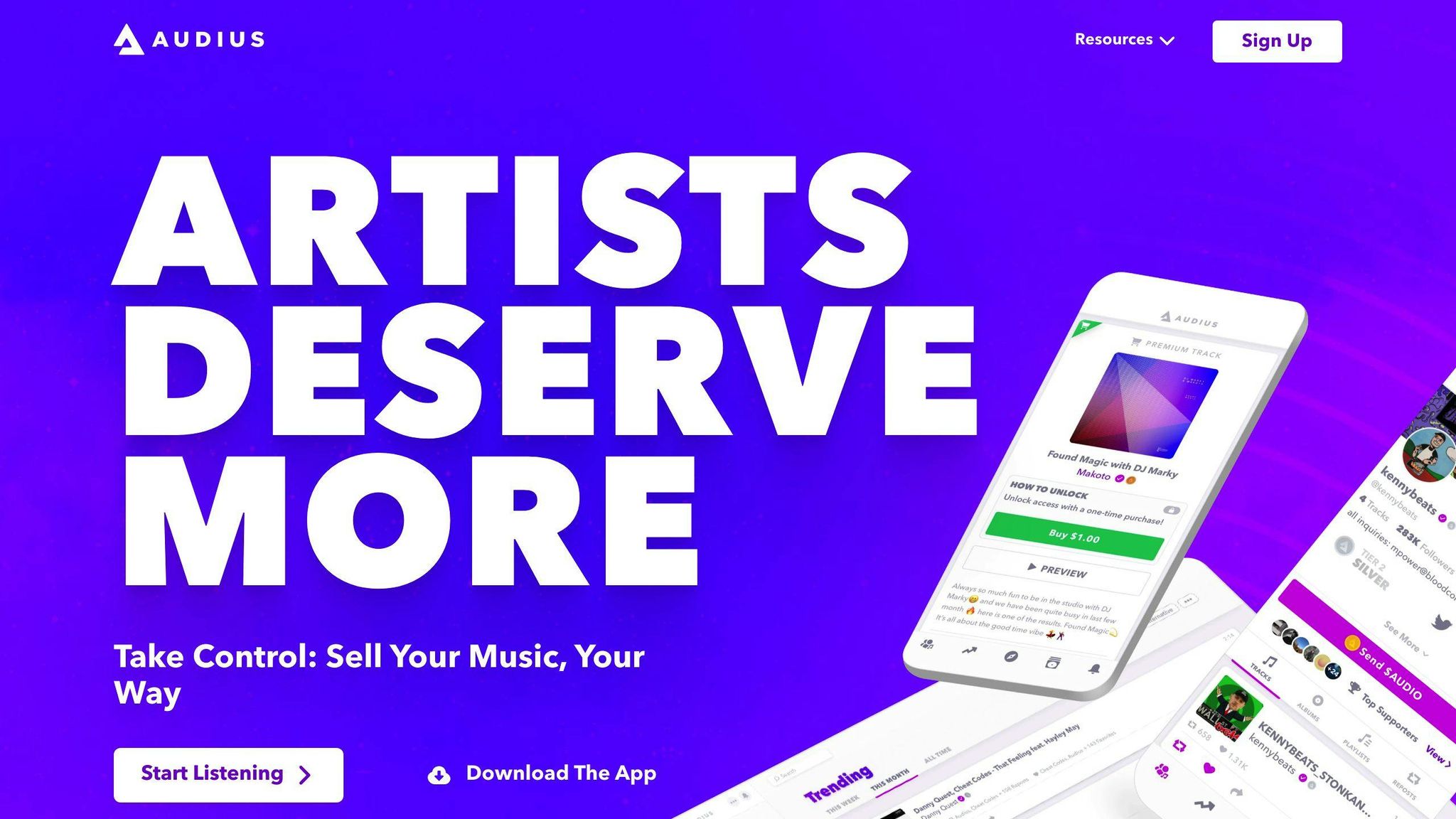
Audius is a decentralized streaming platform that connects artists directly with fans. Artists can upload and sell their music without middlemen, ensuring fair payment. Audius uses blockchain to create a secure record of music plays and streams. This allows artists to track their music data and get paid instantly.
Audius removes the need for intermediaries, so artists keep more of their earnings. Fans can access exclusive content, help curate music, and support artists directly using Audius’ token, $AUDIO. By connecting artists and fans, Audius creates a more sustainable music industry.
Ujo Music: Selling Direct to Fans
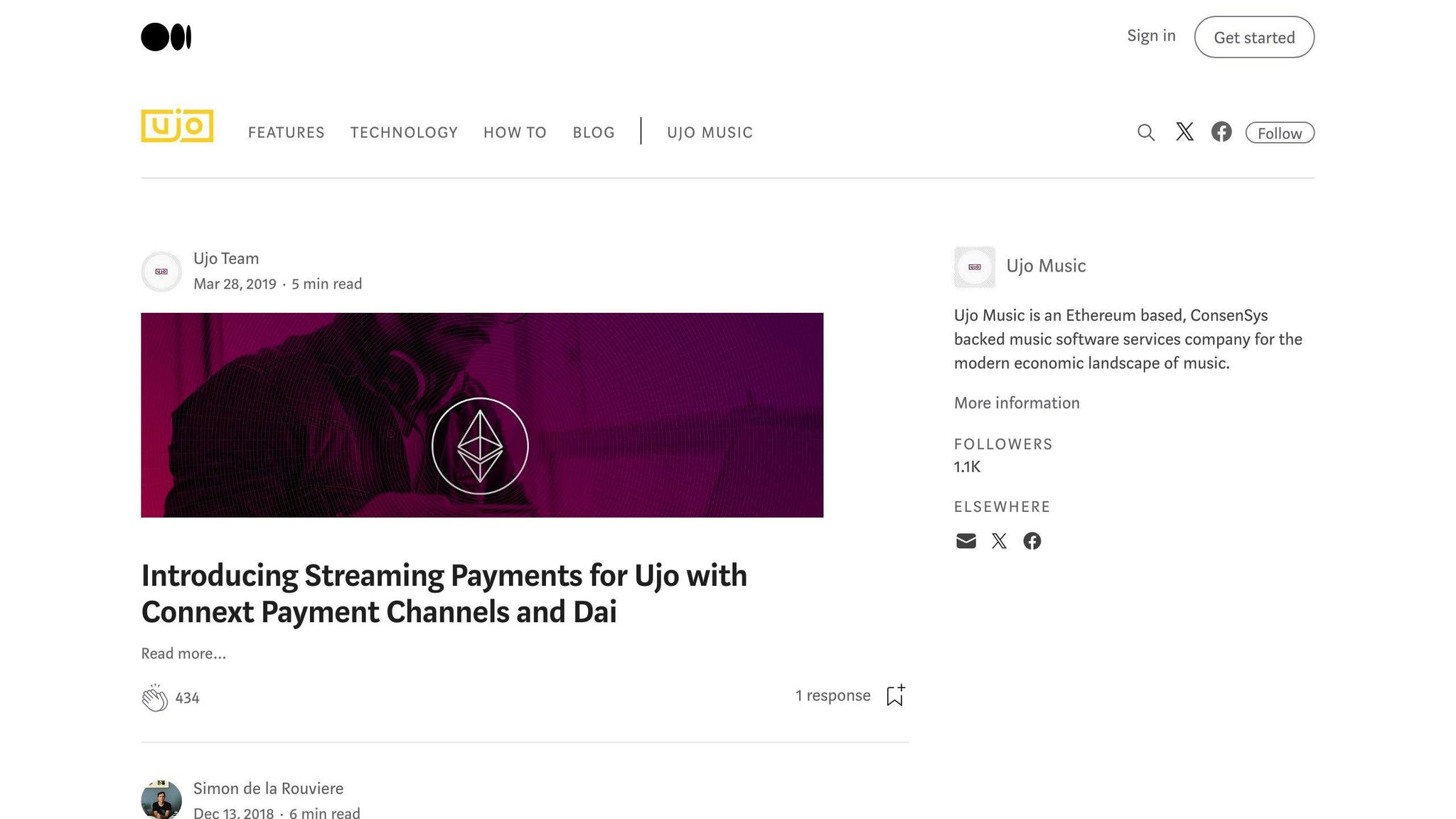
Ujo Music allows artists to sell their music directly to fans and receive instant payments. This platform uses smart contracts to automate royalty payments, ensuring fair pay for artists. Ujo Music provides a decentralized marketplace for artists to showcase their work, connect with fans, and collaborate.
| Platform | Key Features |
|---|---|
| Audius | – Direct artist-fan streaming – Secure music data tracking – Instant payments to artists – Fan engagement and curation |
| Ujo Music | – Direct artist-fan music sales – Automated royalty payments – Decentralized music marketplace – Artist collaboration tools |
These decentralized platforms give artists control over their music and earnings. By cutting out middlemen and using blockchain, they create a more transparent and equitable system for the music industry.
Tokenization and NFTs for Music
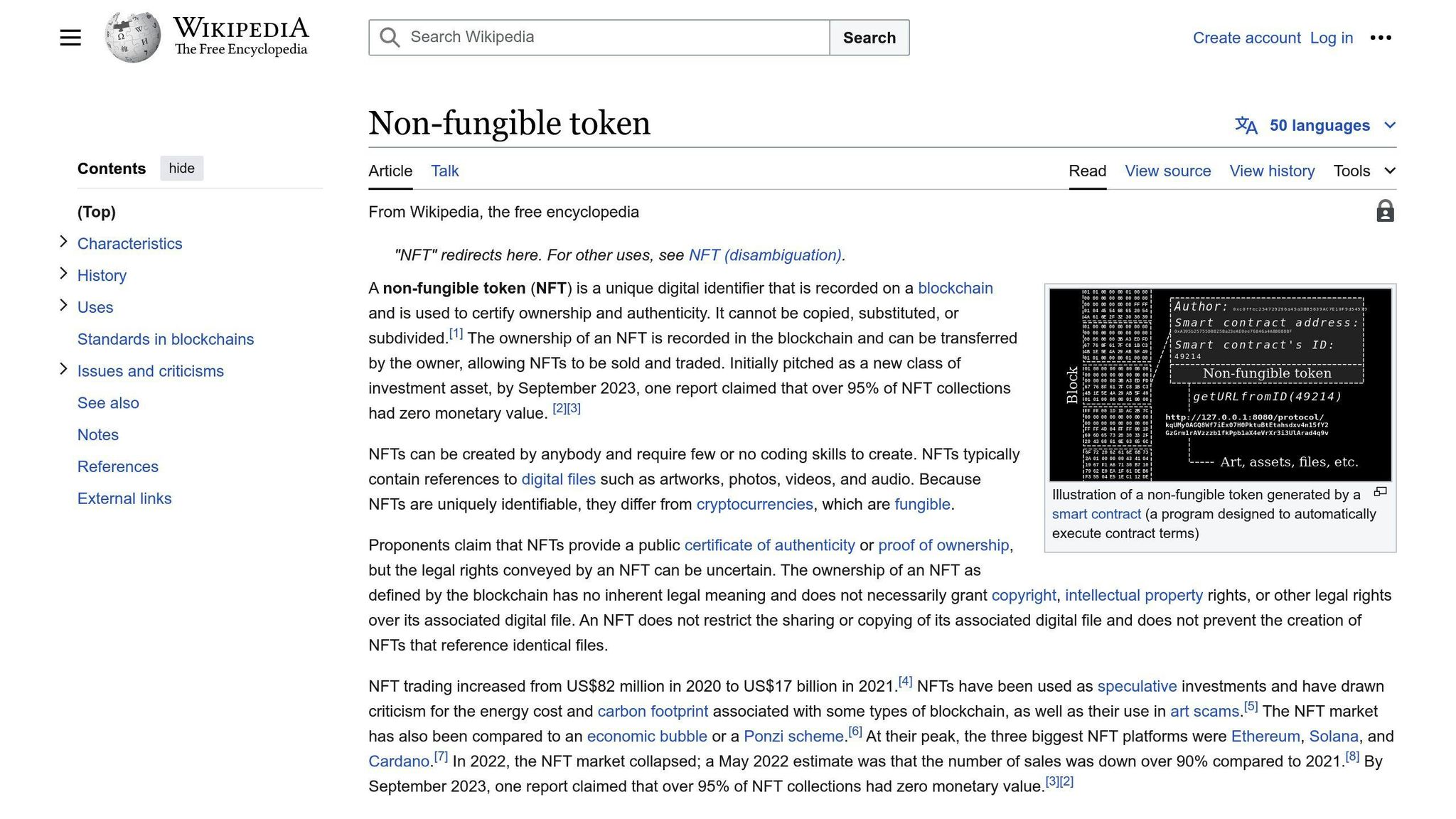
What are Tokenization and NFTs?
Tokenization is turning an asset, like music royalties, into digital tokens on a blockchain. NFTs (non-fungible tokens) are unique digital tokens that show ownership of a specific asset, like a song or album.
For music, tokenization and NFTs allow artists to create digital assets that fans and investors can buy, sell, and trade.
Representing Ownership and Royalties
NFTs can secure and represent ownership and royalty rights, ensuring artists get paid for their work. By tokenizing their music, artists can create a digital asset that represents a percentage of the royalties their music earns.
This allows fans to invest in their favorite artists and share in the royalties, creating a new income stream for artists.
Fractional Ownership Opportunities
Tokenization also enables artists to offer fractional ownership of their music, allowing fans to invest in and own a percentage of the royalties generated by a song or album.
For example, an artist could tokenize 10% of their song’s royalties and sell it to fans. This provides a new revenue stream for the artist and creates a sense of ownership and connection between the artist and their fans.
| Benefit | Description |
|---|---|
| Represent Ownership | NFTs secure and represent ownership and royalty rights |
| New Income Streams | Fans can invest in artists and share in royalties |
| Fractional Ownership | Artists can sell percentages of their royalties to fans |
| Fan Engagement | Fractional ownership creates a closer artist-fan connection |
Tokenization and NFTs give artists a new way to monetize their music, engage with fans, and retain control over their intellectual property. Fans can invest in their favorite artists and share in their success.
Challenges and Considerations
While blockchain offers promising solutions for music royalty management, there are several hurdles to address for successful adoption.
Transaction Speed and Volume
Current blockchain networks may struggle to process the high volume of transactions required by the music industry at the necessary speed. This limitation could lead to delays in royalty payments, hindering blockchain’s adoption.
Evolving Regulations
The regulatory environment for blockchain technology is still developing, lacking clear guidelines. This uncertainty can make industry stakeholders hesitant to adopt blockchain solutions. Additionally, the music industry must comply with various laws, such as copyright, which need consideration when implementing blockchain.
Understanding and Training
Many artists, industry stakeholders, and consumers may not fully grasp blockchain technology’s workings and benefits, creating an education and training barrier for adoption. Programs are needed to ensure all stakeholders can effectively utilize blockchain.
Blockchain Interoperability
The lack of interoperability between different blockchain networks can pose challenges for the music industry. A system that can seamlessly integrate with various blockchain networks is crucial for efficient royalty management. Developing interoperability standards and protocols is essential.
| Challenge | Description |
|---|---|
| Transaction Speed and Volume | Current blockchain networks may not process transactions at the required speed and volume for the music industry, potentially causing royalty payment delays. |
| Evolving Regulations | Unclear regulatory guidelines for blockchain technology and compliance with existing music industry laws like copyright can create uncertainty and hesitation among stakeholders. |
| Understanding and Training | Lack of knowledge about blockchain technology’s workings and benefits among artists, industry stakeholders, and consumers can hinder adoption. Education and training programs are needed. |
| Blockchain Interoperability | The inability of different blockchain networks to work together seamlessly can create challenges for the music industry, requiring the development of interoperability standards and protocols. |
Conclusion
Music Royalties Made Simple with Blockchain
Blockchain technology offers a straightforward solution to the long-standing issues in music royalty management. By providing a transparent and secure record of transactions, blockchain eliminates the need for middlemen, ensuring artists receive their fair share of royalties promptly.
| Benefit | Description |
|---|---|
| Transparency | All transactions are recorded on a public ledger, ensuring accuracy. |
| Efficiency | Automated royalty payments reduce administrative work and delays. |
| Direct Connection | Artists can connect directly with fans, increasing their earnings. |
| Security | Advanced encryption and decentralization protect against fraud and errors. |
The Future of Music Royalties
As blockchain technology advances, we can expect further innovations that will transform the music industry:
- Decentralized Music Platforms: Platforms like Audius and Ujo Music allow artists to sell music directly to fans and receive instant payments.
- Tokenization and NFTs: Artists can create digital assets representing ownership and royalty rights, enabling fans to invest in their favorite artists.
Working Together for a Better Music Industry
The successful integration of blockchain in music royalties requires collaboration between artists, industry stakeholders, and technologists. By sharing knowledge and resources, we can develop and implement blockchain solutions that meet the needs of the music industry.
Together, we can create a more equitable, transparent, and sustainable music industry for all. The future of music royalties is bright, and it’s time to work together to make it a reality.
FAQs
What is blockchain technology for music royalties?
Blockchain technology allows artists to receive royalty payments directly, without middlemen. Here’s how it works:
- Transparent Record: All music plays and royalties are recorded on a public ledger that anyone can view.
- Smart Contracts: Automated agreements ensure royalties are paid correctly and instantly when music is played.
- Direct Payments: Artists get paid directly, cutting out record labels and other intermediaries.
| Traditional System | Blockchain System |
|---|---|
| Many middlemen involved | Direct payments to artists |
| Lack of transparency | Public record of transactions |
| Delayed payments | Instant royalty payouts |
| Risk of errors and fraud | Secure, automated system |
